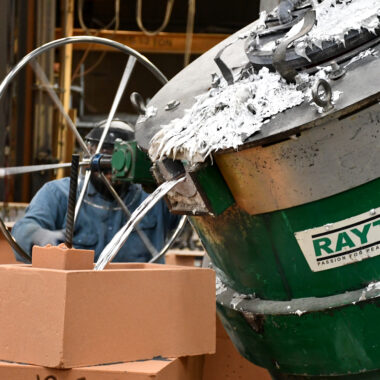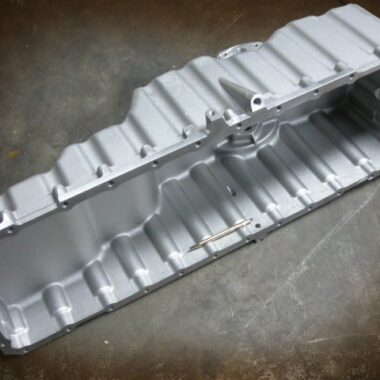Maximizing Outcomes: Casting Aluminum Like a Pro
Aluminum Casting Providers Introduced: Important Insights and Tips
Exploring the world of aluminum spreading services can introduce a world of intricate procedures and nuanced considerations that are vital for successful results. As we venture into the world of aluminum spreading services, prepare to discover the vital elements that can form the trajectory of your projects and raise your understanding of this elaborate craft.
The Essentials of Light Weight Aluminum Casting
What fundamental procedures are entailed in light weight aluminum spreading that develop the foundation of this commonly used manufacturing method? Light weight aluminum casting is a flexible and cost-efficient technique made use of in numerous industries to develop complex and complex steel parts. The procedure begins with the melting of light weight aluminum ingots in a heating system, commonly at temperature levels ranging from 1220 ° F to 1670 ° F, depending on the particular aluminum alloy being utilized. When molten, the light weight aluminum is put right into a pre-designed mold and mildew dental caries, where it strengthens and takes the shape of the mold.
Key elements such as mold and mildew design, gating system, and cooling down rate play a crucial function in figuring out the last top quality of the actors aluminum component. The mold and mildew can be made from various products like sand, steel, or investment spreading wax, depending upon the intricacy of the component and the desired surface area coating. After solidification, the mold is gotten rid of, and the casting undergoes ending up procedures such as heat surface area, machining, and treatment layer to fulfill the needed specifications. Recognizing these essential processes is necessary for accomplishing high-grade aluminum castings with precise measurements and mechanical residential or commercial properties.
Different Casting Approaches Explained
Exploring the various methods employed in light weight aluminum spreading offers useful insights right into the diverse approaches used to accomplish precise and detailed metal parts. One usual technique is sand casting, where a mold is produced utilizing compacted sand around a pattern of the preferred part. An additional approach, pass away spreading, entails infusing molten aluminum into a steel mold and mildew under high stress.
Factors to Think About When Selecting a Carrier
When selecting a light weight aluminum casting provider, reviewing their experience and experience is important for making certain quality and reliability in the production process. The supplier's experience in the field indicates their knowledge with various casting techniques, prospective difficulties, and ideal techniques. It is crucial to make inquiries regarding the kinds of projects they have actually functioned on in the past, guaranteeing they align with the intricacy and specifications of your very own job.
In addition, take into consideration the provider's reputation within the industry. Try to find reviews, endorsements, and study that show their capability to deliver premium aluminum spreadings constantly. A trustworthy company will frequently have qualifications or affiliations with sector organizations, showcasing their commitment to quality and adherence to industry criteria.
In addition, evaluate the supplier's abilities in terms of customization, quantity needs, and task timelines. Ensure that they can suit your particular needs and have the flexibility to scale manufacturing as needed. Reliable communication and transparency relating to prices, lead times, and quality assurance processes are likewise critical variables to consider when selecting an aluminum spreading service carrier.

Common Difficulties and Solutions
Browsing via the intricacies of light weight aluminum casting procedures usually presents suppliers with a series of challenges that require innovative remedies to make sure performance and top quality in manufacturing. One common difficulty faced in aluminum casting is the formation of problems such as porosity, shrinkage, or inclusions because of improper mold and mildew design or poor metal high quality. These flaws can jeopardize the structural integrity of the last product. To address this, makers should carry out comprehensive simulations and examinations to optimize the spreading procedure criteria and make certain the high quality of the molds and products used.
Executing sophisticated modern technologies like computer-aided design (CAD) and computer system numerical control (CNC) machining can boost precision and uniformity in see here aluminum casting. By investing in automation and real-time tracking systems, makers can improve procedure control and decrease variants, ultimately enhancing the total top quality of aluminum actors products.
Tips for Optimizing Your Casting Projects
By making certain that the gating system is properly designed and correctly placed, you can enhance the circulation of liquified light weight aluminum and over here decrease the possibilities of defects in the final spreading. Furthermore, utilizing computer simulations can help in analyzing the circulation and predicting of steel throughout the casting process, allowing for adjustments to be made prior to real manufacturing begins.

Conclusion
To conclude, comprehending the fundamentals of light weight aluminum spreading, different spreading techniques, factors to take into consideration when selecting a provider, usual obstacles and options, and tips for maximizing casting projects are vital for successful outcomes. By sticking to these insights and applying ideal methods, people and companies can make sure reliable and efficient aluminum spreading solutions that satisfy their specific requirements and needs.
Comprehending these basic procedures is essential for achieving premium light weight aluminum spreadings with exact measurements and mechanical residential or commercial properties.
When choosing a light weight aluminum casting solution Continue supplier, assessing their experience and knowledge is important for ensuring top quality and integrity in the manufacturing process. Reliable communication and transparency pertaining to costs, lead times, and quality control processes are additionally important aspects to take into consideration when selecting a light weight aluminum spreading service supplier.
Browsing through the complexities of aluminum casting processes commonly offers producers with a collection of difficulties that call for ingenious services to guarantee performance and top quality in production. One typical challenge faced in aluminum casting is the development of flaws such as porosity, contraction, or inclusions due to incorrect mold layout or inadequate metal quality.